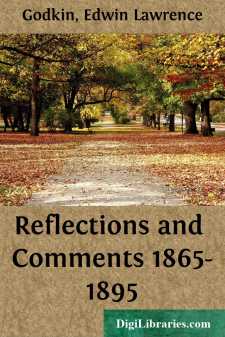Categories
- Antiques & Collectibles 13
- Architecture 36
- Art 48
- Bibles 22
- Biography & Autobiography 813
- Body, Mind & Spirit 142
- Business & Economics 28
- Children's Books 17
- Children's Fiction 14
- Computers 4
- Cooking 94
- Crafts & Hobbies 4
- Drama 346
- Education 46
- Family & Relationships 57
- Fiction 11829
- Games 19
- Gardening 17
- Health & Fitness 34
- History 1377
- House & Home 1
- Humor 147
- Juvenile Fiction 1873
- Juvenile Nonfiction 202
- Language Arts & Disciplines 88
- Law 16
- Literary Collections 686
- Literary Criticism 179
- Mathematics 13
- Medical 41
- Music 40
- Nature 179
- Non-Classifiable 1768
- Performing Arts 7
- Periodicals 1453
- Philosophy 64
- Photography 2
- Poetry 896
- Political Science 203
- Psychology 42
- Reference 154
- Religion 513
- Science 126
- Self-Help 84
- Social Science 81
- Sports & Recreation 34
- Study Aids 3
- Technology & Engineering 59
- Transportation 23
- Travel 463
- True Crime 29
Reflections and Comments 1865-1895
Description:
Excerpt
PEACE
The horrors of war are just now making a deeper impression than ever on the popular mind, owing to the close contact with the battle-field and the hospital into which the railroad and the telegraph and the newspaper have brought the public of all civilized countries. Wars are fought out now, so to speak, under every man's and woman's eyes; and, what is perhaps of nearly as much importance, the growth of commerce and manufactures, and the increased complication of the social machine, render the smallest derangement of it anywhere a concern and trouble to all nations. The consequence is that the desire for peace was never so deep as it is now, and the eagerness of all good people to find out some other means of deciding international disputes than mutual killing never so intense.
And yet the unconsciousness of the true nature and difficulties of the problem they are trying to solve, which is displayed by most of those who make the advocacy of peace their special work, is very discouraging. We are far from believing that the incessant and direct appeals to the public conscience on the subject of war are not likely in the long run to produce some effect; but it is very difficult to resist the conclusion that the efforts of the special advocates of peace have thus far helped to spread and strengthen the impression that there is no adequate substitute for the sword as an arbiter between nations, or, in other words, to harden the popular heart on the subject of military slaughter. It is certain that, during the last fifty years, the period in which peace societies have been at work, armies have been growing steadily larger, the means of destruction have been multiplying, and wars have been as frequent and as bloody as ever before; and, what is worse, the popular heart goes into war as it has never done in past ages.
The great reason why the more earnest enemies of war have not made more progress toward doing away with it, has been that, from the very outset of their labors down to the present moment, they have devoted themselves mainly to depicting its horrors and to denouncing its cruelty. In other words, they almost invariably approach it from a side with which nations actually engaged in it are just as familiar as anybody, but which has for the moment assumed in their eyes a secondary importance. The peace advocates are constantly talking of the guilt of killing, while the combatants only think, and will only think, of the nobleness of dying. To the peace advocates the soldier is always a man going to slaughter his neighbors; to his countrymen he is a man going to lose his life for their sake—that is, to perform the loftiest act of devotion of which a human being is capable. It is not wonderful, then, that the usual effect of appeals for peace made by neutrals is to produce mingled exasperation and amusement among the belligerents. To the great majority of Europeans our civil war was a shocking spectacle, and the persistence of the North in carrying it on a sad proof of ferocity and lust of dominion....


